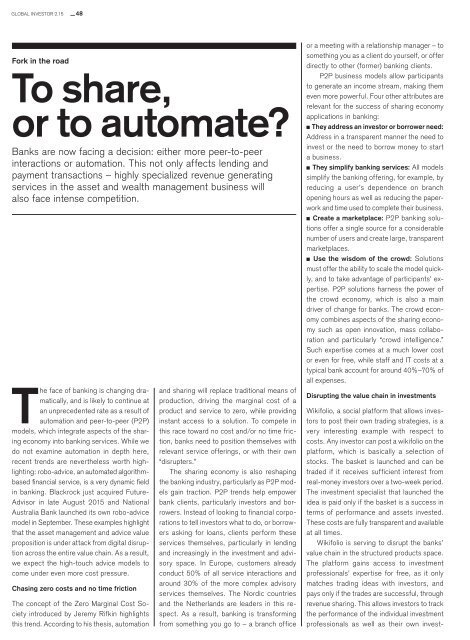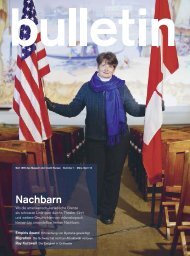The sharing economy
New opportunities, new questions Global Investor, 02/2015 Credit Suisse
New opportunities, new questions
Global Investor, 02/2015
Credit Suisse
Create successful ePaper yourself
Turn your PDF publications into a flip-book with our unique Google optimized e-Paper software.
GLOBAL INVESTOR 2.15 — 48<br />
Fork in the road<br />
To share,<br />
or to automate?<br />
Banks are now facing a decision: either more peer-to-peer<br />
interactions or automation. This not only affects lending and<br />
payment transactions – highly specialized revenue generating<br />
services in the asset and wealth management business will<br />
also face intense competition.<br />
<strong>The</strong> face of banking is changing dramatically,<br />
and is likely to continue at<br />
an unprecedented rate as a result of<br />
automation and peer-to-peer (P2P)<br />
models, which integrate aspects of the <strong>sharing</strong><br />
<strong>economy</strong> into banking services. While we<br />
do not examine automation in depth here,<br />
recent trends are nevertheless worth highlighting:<br />
robo-advice, an automated algorithmbased<br />
financial service, is a very dynamic field<br />
in banking. Blackrock just acquired Future-<br />
Advisor in late August 2015 and National<br />
Australia Bank launched its own robo-advice<br />
model in September. <strong>The</strong>se examples highlight<br />
that the asset management and advice value<br />
proposition is under attack from digital disruption<br />
across the entire value chain. As a result,<br />
we expect the high-touch advice models to<br />
come under even more cost pressure.<br />
Chasing zero costs and no time friction<br />
<strong>The</strong> concept of the Zero Marginal Cost Society<br />
introduced by Jeremy Rifkin highlights<br />
this trend. According to his thesis, automation<br />
and <strong>sharing</strong> will replace traditional means of<br />
production, driving the marginal cost of a<br />
product and service to zero, while providing<br />
instant access to a solution. To compete in<br />
this race toward no cost and/or no time friction,<br />
banks need to position themselves with<br />
relevant service offerings, or with their own<br />
“disrupters.”<br />
<strong>The</strong> <strong>sharing</strong> <strong>economy</strong> is also reshaping<br />
the banking industry, particularly as P2P models<br />
gain traction. P2P trends help empower<br />
bank clients, particularly investors and borrowers.<br />
Instead of looking to financial corporations<br />
to tell investors what to do, or borrowers<br />
asking for loans, clients perform these<br />
services themselves, particularly in lending<br />
and increasingly in the investment and advisory<br />
space. In Europe, customers already<br />
conduct 50% of all service interactions and<br />
around 30% of the more complex advisory<br />
services themselves. <strong>The</strong> Nordic countries<br />
and the Netherlands are leaders in this respect.<br />
As a result, banking is transforming<br />
from something you go to – a branch office<br />
or a meeting with a relationship manager – to<br />
something you as a client do yourself, or offer<br />
directly to other (former) banking clients.<br />
P2P business models allow participants<br />
to generate an income stream, making them<br />
even more powerful. Four other attributes are<br />
relevant for the success of <strong>sharing</strong> <strong>economy</strong><br />
applications in banking:<br />
<strong>The</strong>y address an investor or borrower need:<br />
Address in a transparent manner the need to<br />
invest or the need to borrow money to start<br />
a business.<br />
<strong>The</strong>y simplify banking services: All models<br />
simplify the banking offering, for example, by<br />
reducing a user’s dependence on branch<br />
opening hours as well as reducing the paperwork<br />
and time used to complete their business.<br />
Create a marketplace: P2P banking solutions<br />
offer a single source for a considerable<br />
number of users and create large, transparent<br />
marketplaces.<br />
Use the wisdom of the crowd: Solutions<br />
must offer the ability to scale the model quickly,<br />
and to take advantage of participants’ expertise.<br />
P2P solutions harness the power of<br />
the crowd <strong>economy</strong>, which is also a main<br />
driver of change for banks. <strong>The</strong> crowd <strong>economy</strong><br />
combines aspects of the <strong>sharing</strong> <strong>economy</strong><br />
such as open innovation, mass collaboration<br />
and particularly “crowd intelligence.”<br />
Such expertise comes at a much lower cost<br />
or even for free, while staff and IT costs at a<br />
typical bank account for around 40%–70% of<br />
all expenses.<br />
Disrupting the value chain in investments<br />
Wikifolio, a social platform that allows investors<br />
to post their own trading strategies, is a<br />
very interesting example with respect to<br />
costs. Any investor can post a wikifolio on the<br />
platform, which is basically a selection of<br />
stocks. <strong>The</strong> basket is launched and can be<br />
traded if it receives sufficient interest from<br />
real-money investors over a two-week period.<br />
<strong>The</strong> investment specialist that launched the<br />
idea is paid only if the basket is a success in<br />
terms of performance and assets invested.<br />
<strong>The</strong>se costs are fully transparent and available<br />
at all times.<br />
Wikifolio is serving to disrupt the banks’<br />
value chain in the structured products space.<br />
<strong>The</strong> platform gains access to investment<br />
professionals’ expertise for free, as it only<br />
matches trading ideas with investors, and<br />
pays only if the trades are successful, through<br />
revenue <strong>sharing</strong>. This allows investors to track<br />
the performance of the individual investment<br />
professionals as well as their own invest-

















